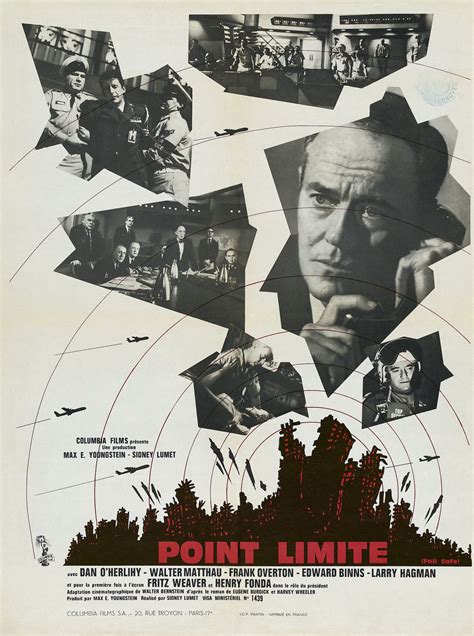Fail Safe
directed by: Sidney Lumet, year: 1964
actors: Henry Fonda, Walter Matthau, Larry Hagman, Dan O'Herlihy
actors: Henry Fonda, Walter Matthau, Larry Hagman, Dan O'Herlihy

Description:
Fail Safe is a tense Cold War thriller that explores the terrifying possibility of accidental nuclear war. The film follows a U.S. Air Force bomber group that mistakenly receives orders to drop a nuclear bomb on Moscow. As efforts to recall the planes fail, the American President and his advisors race against time to prevent an all-out nuclear conflict. The film delivers a sobering commentary on the precarious nature of technology and human error in the nuclear age.Keywords:
Thriller, Cold War, Nuclear War, Suspense, DramaWhat does it mean "fail safe"?
In the context of the movie "Fail Safe," the term "fail safe" refers to a system designed to prevent catastrophic failure, particularly in critical situations like nuclear war. It implies that mechanisms are in place to ensure that if a system malfunctions or an error occurs, it will default to a safe state to avoid disaster. In the film, this concept is central to the narrative, as a malfunction in the military command leads to a tense standoff, highlighting the dire consequences of failure in systems meant to ensure security and prevent conflict.
Was Dr. Strangelove based on fail-safe?
"Dr. Strangelove," directed by Stanley Kubrick, was not directly based on "Fail Safe," but both films share similar themes regarding nuclear war and the Cold War era. "Fail Safe," released in 1964, is a serious adaptation of Eugene Burdick and Harvey Wheeler's novel, focusing on a malfunction that leads to the potential for nuclear disaster. In contrast, "Dr. Strangelove," also released in 1964, is a satirical take on the same subject, highlighting absurdities in military and political decision-making. Both films reflect the tensions of their time but approach the topic differently.
What is a fail-safe approach?
A fail-safe approach is a design principle aimed at ensuring safety and preventing catastrophic failures in systems, particularly in critical operations like nuclear command and control. In the context of the movie "Fail Safe," this concept is central to the plot, where a malfunction leads to the potential launch of nuclear weapons. The idea is to implement safeguards that allow a system to revert to a safe state or prevent undesirable outcomes, even in the event of a malfunction or human error. This approach emphasizes redundancy, controls, and clear protocols to minimize risks.
Is fail-safe worth watching?
"Fail Safe" is definitely worth watching, especially if you're interested in Cold War-era films and nuclear tension narratives. Released in 1964 and directed by Sidney Lumet, it explores the harrowing consequences of a nuclear launch error, raising ethical questions about war and responsibility. The film features strong performances, particularly from Henry Fonda, and its tense, suspenseful atmosphere keeps viewers engaged. While it may feel dated to some, its themes remain relevant, making it a compelling and thought-provoking experience.
Explore More Categories:
Manipulation Star Wars Unrequited Love Prophecy Totalitarianism Relationships Vampirism Watergate Scandal Existentialism Classic Hollywood Empowerment Archaeology Gunslinger Moral Ambiguity Hacker Expectations Vs Reality Emotional Conflict Creativity Celebrity Humor Resistance Classic Modern Fairy Tale Superpowers Wit